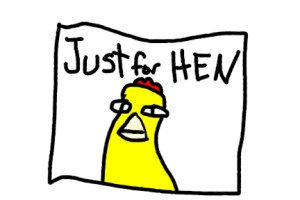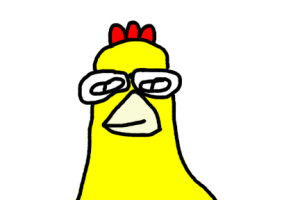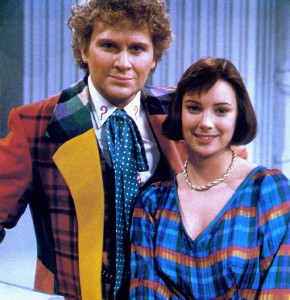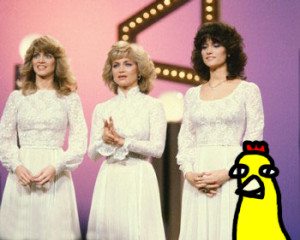Only Their Hairdresser Knows For Sure
(Broadcast 11/22/2013)
I know there are a lot of products out there to help people hide their gray hair. You can just dye it all, or you can leave some gray to look “distinguished,” or you can do just your beard, if you have one and it’s giving away your grayness. I have no problem with gray hair. I think it looks nice. Of course, as my wife likes to point out, I don’t have any, so I should shut up about it. If I was already going gray and I talked about how gray hair looks good, it would sound like I doth protest too much. I’m laying groundwork here for my inevitable be-graying. I just want everyone to know I thought this before I had to think it. Anyway, chickens, as far as I know, do not go gray. They look distinguished in their own ways, I suppose.
You might recall that the Mandrell Sisters are my three Buff Orpingtons who are nearly identical (at least to my eye). This has caused me no end of grief, the thinking being that I am not seeing their uniqueness. Well, there have been some developments. All three sisters have now gone through their annual molts, and things are not the same.
The first difference I noticed was that one of them was much, much lighter than she had been. She’s no longer yellow, but not quite beige. I’d say she’s become a sort of Silver Fox, if a. that wasn’t creepy to say about a chicken, and b. foxes didn’t eat chickens. I don’t want to call her that which intends to eat her. This is what got me thinking about gray hair. She might look a little distinguished, for a chicken. I don’t know that I will go to her for advice or anything, but something about her seems more respectable than it used to.
The Mandrell Sister who has had issues with vent gleet, a.k.a. Gleety Mandrell, has stood out from the other two for a while now. At first, it was because she had the nasty butt typical of nasty butt disease. Then it was because I trimmed off all the nasty feathers, and she was the only one with a featherless hind end. As if this poor chicken hadn’t been through enough, her molt was pretty rough, too. Her tail feathers looked ragged to the point that I thought she was being picked on, until I noticed that she was bald around the neck where other feathers had fallen out. She was definitely on the “mange” end of the molt spectrum. The feathers are coming back in, but what I’ve noticed is that the new ones are lighter, but there are still plenty of old ones that are the original darker color. I’d say she looks mottled, now, if that’s what mottled means. Almost a calico, in way. I like calico cats. Calico chickens? She looks like the equivalent of wearing clashing plaids. I’ll try not to judge.
Then there’s the third sister. She has molted, but everything looks exactly the same, like that little black dress that never goes out of style. Maybe she’s behind the times as far as what’s new in chicken fashions, or maybe she’s doing that whole retro thing. Or maybe she’s like that friend who never seems to get old. Don’t you just hate that person? I don’t know. What I do know, is that I can now tell them apart, and this is fraught with issues. Do I now give them individual names? I liked the idea of a group name, though if anything happened to one of them, how would I cope? There are three actual Mandrell Sisters. What if one of the chicken Mandrell Sisters died? Would I have to have one of the human ones whacked for consistency? I have been known to go a long way for a joke, but I’m not sure I’m willing to go that far. Yet. Should I give them nicknames, like, say, Gleety? Do I just roll with the changes? Or do I do like the third chicken, and just stay put? These are big questions. Perhaps in the New Year, I will have answers. For now, I will keep the chicken ship steady as she goes, and if a new name (that isn’t Gleety) should present itself, I will be ready. Who knows, maybe I’ll even have some gray hair by then.
Tags: backyard chickens, chicken identification, chickens, Erik P. Kraft, Garden Guys, hipster farming, molting




